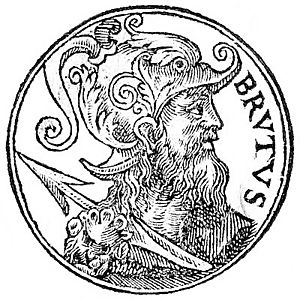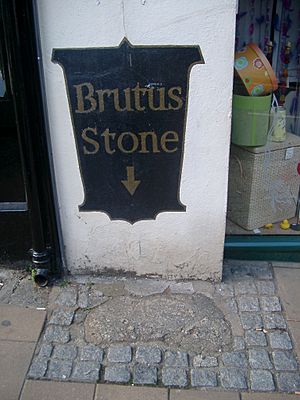Brutus of Troy facts for kids
Quick facts for kids
Brutus
|
|
|---|---|
| King of Great Britain (legendary) | |
 |
|
| Spouse(s) | Innogen |
| Issue | |
| Father | Silvius |
| Mother | Wife of Silvius |
Brutus, also called Brute of Troy, is a legendary hero from ancient stories. People in medieval Britain believed he was a descendant of the famous Trojan hero Aeneas. The legend says Brutus was the first king and founder of Britain, and that the island was named after him. This exciting story first appeared in a 9th-century book called Historia Brittonum. It became even more famous thanks to Geoffrey of Monmouth's book, Historia Regum Britanniae, written in the 12th century.
Contents
The Story of Brutus
Brutus's Early Life
The old stories say that Brutus was the grandson of Aeneas, a brave hero from the Trojan War. Aeneas settled in Italy after the war. His son, Ascanius, founded a city called Alba Longa. Brutus's father was Silvius, Ascanius's son.
Before Brutus was born, a magician made a prediction. He said the child would be a boy, very brave, and loved by many. But he also said Brutus would accidentally kill both his parents. Sadly, this prediction came true. Brutus accidentally killed his father with an arrow while hunting. Because of this, he was sent away from Italy.
Brutus's Journey and Adventures
After leaving Italy, Brutus traveled across the sea. He wandered through different lands, including Gaul, which is now France. In Gaul, he founded a city that later became known as Tours.
Later, Brutus found a group of Trojans who had been forced into slavery in Greece. He became their leader and helped them escape. They fought battles against the Greek king, Pandrasus, and won. Brutus took Pandrasus hostage and made him free the Trojans. As part of the agreement, Brutus married Pandrasus's daughter, Innogen. He also received ships and supplies for his journey.
A Prophecy and New Lands
Brutus and his people set sail. They landed on a deserted island where they found an old temple dedicated to the goddess Diana. Brutus performed a special ritual and then fell asleep in front of Diana's statue. In a dream, the goddess showed him a vision. She told him about a far-off island in the western ocean. This island was inhabited only by a few giants. Diana said this was the land where Brutus and his people were meant to settle.
On their journey, Brutus met another group of exiled Trojans. They were led by a strong warrior named Corineus. Together, they continued their travels.
Arriving in Britain
Brutus and his followers eventually reached the island Diana had shown him. At that time, the island was called Albion. It was home to giant descendants of Alebion. Brutus and his brave Trojans fought these giants and defeated them.
Brutus then renamed the island after himself, calling it Britain. He became its first king. His loyal warrior, Corineus, became the ruler of Cornwall, a region that was named after him.
During a celebration, the remaining giants attacked Brutus's people. The Trojans fought back and killed all the giants except for their leader, the biggest giant named Goemagot. Goemagot was saved for a wrestling match against Corineus. Corineus, being very strong, threw the giant over a cliff, defeating him.
Founding London
Brutus then founded a new city on the banks of the River Thames. He called it Troia Nova, which means "New Troy." Over time, this name changed to Trinovantum, and later, the city became known as London.
Brutus created laws for his people and ruled Britain for twenty-four years. After his death, he was buried in Trinovantum. His island kingdom was then divided among his three sons: Locrinus received England, Albanactus received Scotland, and Kamber received Wales.
Brutus's Legacy

The story of Brutus was very popular in medieval Britain. Many old books and chronicles, like Roman de Brut and Layamon's Brut, were named after him. The word brut even came to mean a historical record of Britain.
Early historians often started their accounts of Britain with the story of Brutus. For a long time, people believed that the Brutus myth was true history. For example, Holinshed's Chronicles from 1577 treated it as fact. However, in the 20th century, archaeologists proved that London was actually founded much later, in 43 AD.
The 18th-century poet Hildebrand Jacob wrote a long poem about Brutus, called Brutus the Trojan, Founder of the British Empire. This poem was inspired by the famous Roman epic, the Aeneid.
Geoffrey of Monmouth's story says that Brutus and his followers first landed at Totnes in Devon. Today, there is a stone on Fore Street in Totnes, known as the "Brutus Stone," which marks this legendary landing spot.
In 2021, a radio station in Totnes, Soundart Radio, even created a radio play based on the Brutus myth.
 | Precious Adams |
 | Lauren Anderson |
 | Janet Collins |

